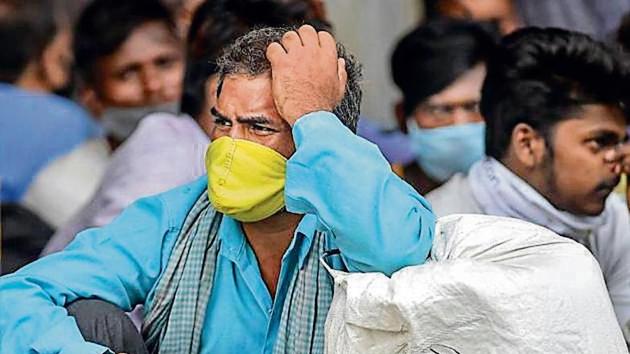Anger over unemployment, migrant crisis could sway Nitish’s vote bank
Since 2005, when Nitish Kumar came to power, the EBCs – who together form roughly a quarter of the electorate -- have backed the Janata Dal (United) but this time, anger over the government’s handling of the migrant crisis and the pervasive unemployment is making many reconsider their political choices.
Sunil Kumar, a cab driver in his early 40s in Patna, was one of the many people who lost their job during the 68-day nationwide Covid-19 lockdown earlier this year.

Kumar returned from Mumbai to his native village of Hilsa in Bihar’s Nalanda district in June and spent close to two-and-a-half months without a job – one of roughly 2.6 million migrant workers who were forced to return to the state because the pandemic wiped out their jobs.
After initial hardship of few months, Kumar moved to Patna and took up the job of driving a taxi. “I enjoyed my stay at village and helped my family in agriculture fields. But, since I was not getting any regular income, I contacted one of my old employers with whom I have worked for some time in Patna,” he said.
Kumar belongs to the extremely backward classes (EBC), a collection of smaller backward caste communities who were nurtured by Bihar chief minister Nitish Kumar as a counter to the his rival Lalu Prasad’s influential base of Yadavs and Muslims.
Since 2005, when Nitish Kumar came to power, the EBCs – who together form roughly a quarter of the electorate -- have backed the Janata Dal (United) but this time, anger over the government’s handling of the migrant crisis and the pervasive unemployment is making many reconsider their political choices.
This anger is now compounded by the confusion over competing claims by the National Democratic Alliance and the opposition Grand Alliance over jobs – the former has promised to generate 1.9 million jobs while the latter has pledged one million government jobs. “There is anger and they are confused as well,” feels Saibal Gupta, member secretary of Asian Development research Institute (ADRI).
The National Democratic Alliance (NDA), of which JD(U) is a part, knows this.
“A majority of them, about 75%, are from extremely backward castes, 20% are SCs/STs [scheduled castes/scheduled tribes] and barely 5% are from upper caste. The caste profile of the migrants suits us, even though they are a bit against us today because of the vacillation of the state government over their return,” said Bharatiya Janata Party (BJP) MLC Sanjay Paswan.
EBC history
The EBCs are the most visible part of Kumar’s social engineering that propelled him to power in 2005 after 15 years of rule by Lalu Prasad and his wife Rabri Devi.
The list of EBCs was first carved out of the larger Other Backward Class (OBC) group by socialist leader Karpoori Thakur, and Nitish Kumar instituted more administrative measures to cement the category in 2007. Currently, all OBC communities with the exception of the four-most dominant castes -- Yadavs, Kurmis, Khushwahas, and Koeris –form the bulk of the EBC category, which has roughly 135 castes.
To Kumar, who hailed from the numerically smaller Kurmi caste, the creation of the EBCs was a way to counter his rival Prasad’s more formidable caste coalition.
But this time, many people from the EBC category say that 15-year-old fatigue combined with extended lockdown woes of common people is making them rethink.
“Initially, we were also rooting for a change. But, after re-assessing, our village has decided to back him again,” said Mohan Kumar, a tea-seller of Obra, in Aurangabad district.
Another tea-stall owner, who did not want to be named in Aurangabad, also echoed the same sentiment. “The resentment on ground is there,” he wondered.
NDA optimistic
The NDA thinks the steps taken by the state and central government, the Prime Minister’s migrant employment scheme, and Nitish Kumar’s old ties with the EBCs will help them.
“There is no denying in the fact that there was an initial resentment among migrants, the EBCs but ever since a number of measures were taken by the state government, the EBCs are also re-grouping themselves and they will fall back on JD (U),” said Sunil Rajak, election in-charge of JD (U) at Nokha.
“This is caste polarization of Bihar,” said, JD (U) principal general secretary, K C Tyagi. “When there is polarization among other castes, there is bound to be polarization among EBC as well. People of the community have realized that Covid pandemic and resultant migration was a nature-made tragedy and the state government did its best to provide relief,” he added.
The Rashtriya Janata Dal (RJD), which is contesting 144 seats, has given 25 tickets to candidates from the EBCs – an all-time high in recent elections. This is seen as an attempt to expand its vote base beyond its traditional Muslim-Yadav combine.
“We are A to Z party and EBC have always been with the RJD. We hace given tickets to 25 candidates from EBC category,” said Tejashwi Yadav in a recent interview to Hindustan Times.
Moreover, RJD leader Tejashwi Yadav’s promise of one million government jobs appears to have struck a chord with some sections of the community.
“The one million job announcement by the Grand Alliance, to some extent has won over the migrants. Youth are also enthused and EBCs are in two minds,” said D M diwakar, former director of A N Sinha Institute for Social Studies.
This confusion is palpable in several small EBC communities. “Things are not very good. But where is the option. We are still accessing the things,” said a person belonging to Dhanuk community on condition of anonymity.
The JD(U) has given 19 tickets to candidates from its quota of 115 seats.




